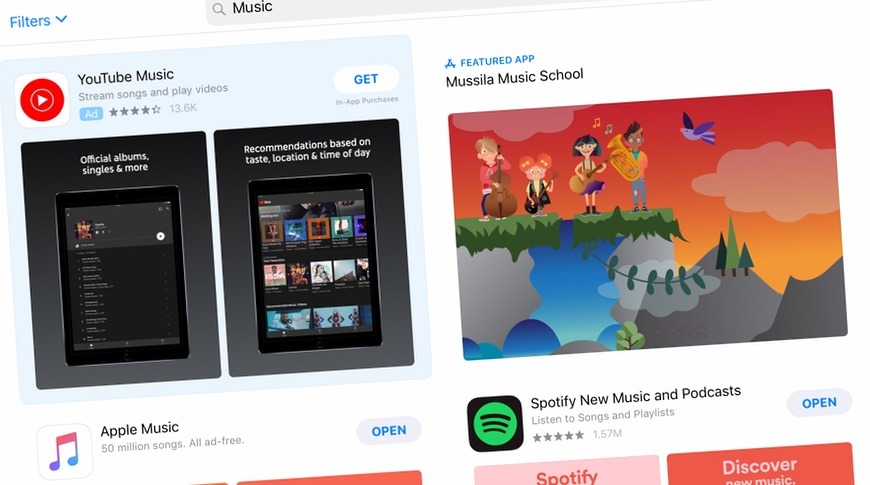Prominent Apple apps in App Store search results face more criticism
The search function of Apple's App Store has come under fire again with a report reasserting the claim the algorithm unfairly pushes Apple's own apps to the top of the list in related searches, making it tough for competing apps providing similar services to find an audience.
The dominance of tech companies and operators of digital marketplaces have faced stiff criticism and accusations they are not playing fairly, with Apple and Google thought to be gatekeepers deciding which apps are presented to consumers. Due to being the main point of contact for device users to find new apps, the results of searches face extra scrutiny, with increased calls of foul play in cases where the marketplace owner's apps top the list in searches.
In an investigation by the New York Times, based on six years of search results compiled by Sensor Tower, Apple's apps have ranked in first place for at least 700 search terms for quite some time. The data, which includes rankings of more than 1,800 apps across 13 keywords since 2013, is said to illustrate "the influence as well as the opacity of the algorithms that underpin tech companies' platforms."
In the case of Apple's own apps, they were added to the App Store in June 2016, and have consistently become the top search result for many popular terms.
In some cases, such as a search for "Music," Spotify was the first result for years, then fell to fourth following the launch of Apple Music in June 2016. Apple Music was joined by other Apple apps, with eight apps including some unrelated to music at the top for the search by the end of 2018, while Spotify was in 23rd place.
Responding to the report, Apple SVPs Phil Schiller and Eddy Cue insisted there was "nothing underhanded about the algorithm," with Apple not manually alter search results for its own benefit. Instead, the apps are ranked higher due to their popularity and because of their generic names being caught up in related searches.
"There's nothing about the way we run search in the App Store that's designed or intended to drive Apple's downloads of our own apps," said Schiller. "We'll present results based on what we think the user wants."
In the case of multiple Apple apps reaching the top of search charts, it is suggested the algorithm sometimes groups apps by producer, though that was tweaked in July to minimize its effect on Apple's apps.
The argument echoes a similar story from the Wall Street Journal in July, which the report references. At that time, AppleInsider's own testing could not replicate results described in the report, with non-Apple apps taking pole position below the search ad in 56 of 60 searches.
Apple's knowledge of how the search algorithm works also helps propel apps to the top. In the instance of the Apple Card launch, the Apple Wallet app became the top listing in searches for "money," "credit," and "debit" for the first time, with the speculation by Cue and Schiller that the team added the terms to the app's metadata.
"We can just tell you that we've not done anything to drive that - that is, other than launching a great wallet, an Apple Card, and marketing the heck out of it," said Schiller.
On corrections made over the last few months, which resulted in fewer Apple apps appearing at the top of searches, Schiller and Cue indicate search has been working fine, but Apple wanted to handicap itself to aid other developers. "We make mistakes all the time," said Cue, with Schiller following up "We're happy to admit when we do. This wasn't a mistake."
 Malcolm Owen
Malcolm Owen














 Amber Neely
Amber Neely
 Thomas Sibilly
Thomas Sibilly
 AppleInsider Staff
AppleInsider Staff
 William Gallagher
William Gallagher

 Christine McKee
Christine McKee










57 Comments
It's their app store they can do what they want.
So? That seems right to me: If I am looking for an app -- say a spreadsheet program -- I will want to see what Apple has to offer more than anything else.
If this is considered unfair, I hope it's applied unilaterally throughout all stores. Was in Target on the weekend and their home brand products were prominently displayed in the walking aisles, again and again. So you literally had to walk by them to go down and search for a different product. Have yet to search for something on Amazon and not get the Amazon-branded version as the first listing if it exists. Or other brands who paid to be the top result.
"There's nothing about the way we run search in the App Store that's designed or intended to drive Apple's downloads of our own apps," said Schiller. "We'll present results based on what we think the user wants."
So why did they tweak the App Store search algorithms then? Saying we did nothing wrong but we changed our algorithms anyway makes it seem like they were doing something wrong and corrected it after being outed by the WSJ and NYT.